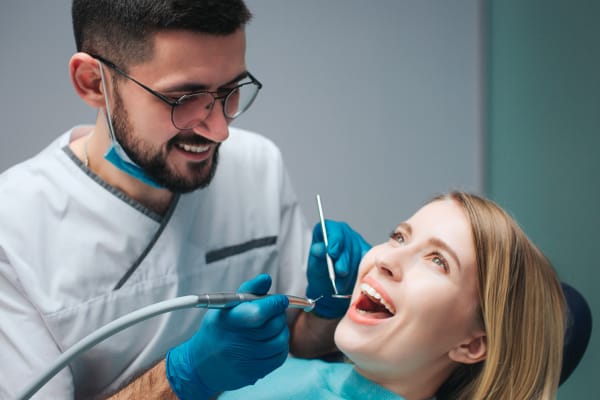No Widget Added
Please add some widget in Offcanvs Sidebar
Shopping cart
- Phone:+91-99116 16919
- Email:info@globalhealthtrip.com
Please add some widget in Offcanvs Sidebar
Shahin Bagh, Abul Fazal II, Jamia Nagar, Okhla, New Delhi 110025

Dental care refers to the upkeep and health of the entire oral cavity- starting from the gums up to the teeth. The process includes brushing, flossing, and professional cleaning. It helps prevent diseases such as tooth decay and gum disease and others related to dental care. Good dental hygiene not only helps one retain the cosmetic appearance of the teeth but also significantly affects his general health since a bad condition may cause serious diseases such as heart conditions and diabetes.
Routine check-ups permit early detection of the onset of dental problems such as cavities, gingivitis, or misalignments, thus allowing for early intervention. Dental professionals include dentists and hygienists. Services rendered include preventive care, such as cleanings and fluoride treatment, to the restoration such as fillings, crowns, and root canals. Orthodontics, which includes the adjustment of aligned teeth and jaws, is also a very important part of dental care.
Good oral health is important to everyone at all ages, starting from childhood up to adult years and gets much more significant as one goes along. In infants and children, dental care aims at the establishment of healthy habits, but adults’ oral diseases are mainly on managing the wear and recession of their gums combined with perhaps more invasive treatments such as implants or dentures. Good oral health requires good hygiene habits in combination with periodic professional care throughout a person’s life.
Historical Background The history of dental practice goes back as far as thousands of years, when the earliest forms of dental practice, using crude implements and practices, were undertaken to preserve oral health. For example, it has been believed that the ancient Egyptians used a kind of toothpaste made from ground pumice stone and wine vinegar to clean their teeth. In fact, excavations have uncovered the use of procedures for the extraction of teeth and primitive prosthetics dating back to 7000 BC.
Ancient Greeks were the first to detail the treatment of tooth decay and other oral health issues, while the Roman developed dental care that allowed them to learn manufacturing dental instruments and oral hygiene. A Chinese history dates the practice of using dental fillings since ancient times when in the 7th century they documented it using a mixture of silver and mercury.
The modern age of dentistry began during the 18th century through contributions from various sources, most notable of which was the French surgeon Pierre Fauchard, often referred to as the “father of modern dentistry.” Fauchard brought new techniques and instruments for treating the teeth and gums and laid the foundation for modern dental practices. In the 19th century, anesthesia was available for dental procedures and dental schools became established, which furthered the profession.
Today, dental care is a highly advanced branch of medicine with technologically advanced appliances like X-rays, lasers, and digital imaging, which help in more accurate and minimally invasive diagnosis and treatment.
Access to care: Many people, mainly in underserved regions, do not have access to affordable dental care.
Dental phobia: This scares patients away from seeking the right treatments; thus their conditions might be worse.
Expensive treatments with a high cost: For instance, operations like implants, orthodontics are quite expensive
Various treatments are used for various dental conditions. Preventive treatments include regular professional cleaning, application of fluoride, and sealants. More complicated conditions are treated with restorative treatments such as fillings, crowns, bridges, and root canals to restore function and appearance.
Cosmetic dentistry treatments that improve the natural appearance of the teeth are whitening, veneers, and bonding. Orthodontics corrects aspects where the teeth do not appear or lie correctly from either a definition point of view or from a bite point of view and this is done with braces, clear aligners, or retainers. For extreme cases of destruction or losses, dental implants, dentures, or oral surgery must be used.

Periodontal treatments; deep cleaning will likely occur if the procedures beyond this also include treatments like surgery.
Root canal therapy
We are the best at providing expert dental care with state-of-the-art facilities and individualized treatments for long-lasting oral health.
Our dental treatment plan is centered on preventive care and long-term oral health for every age. These include:
Dental care medical tourism allows patients to get quality dental treatments at lower prices in their own countries. India remains one of the favorite destinations because of its professionals, modern facilities, and their relative affordability. Dental tourists usually treat themselves to implants, veneers, or full mouth rehabilitations in addition to traveling for the necessary treatment. A pretty good option for patients who wish to improve their dental services without the burden of significant financial cost, medical tourists can save on the cost while receiving expert care, combining treatment with vacationing in the process.
Medical tourism in dental care offers several advantages such as cost savings, access to advanced treatments, and reduced waiting times. Many countries that have well-established medical tourism provide some of the world’s best dental care at prices significantly lower than those charged in the West. Shorter periods of recovery can be tolerated in resort-like settings as various treatments, such as implants, crowns, or cosmetic dentistry, are received. In addition, many of these facilities approach care holistically and coordinate individualized treatment plans so that care can be undertaken in conjunction with most recreational pursuits. This growing trend has provided an opportunity for the people to attain quality dental care with affordability and treatment success.
Our team of professionals ensures your dental health by delivering expert care for a healthier, brighter smile.
To be able to prevent cavities, one has to basically maintain an overall oral health program through which you have to follow some routine actions like brushing your teeth twice a day using fluoride paste, flossing once a day, not consuming sweet or acidic foods and beverages, getting regular dental checkups and cleanings, drinking lots of water and chewing sugar-free gum in between brushings.
The three traditional options for someone who has lost his or her teeth are: implants, bridges, and dentures. Although implants offer the replacement tooth that closely resembles the former teeth in both shape and feel, bridges or dentures can be an alternative depending on the other condition of the remaining teeth. Your dentist will advise you on the best based on your individual need.
While many are afraid of dentists, there are ways to curb such fears. For starters, you should opt for a dentist who is aware of your fears and creates a comfortable atmosphere. You can then talk about the possibility of sedation to ease the procedures. Other forms of relaxation, including listening to music or breaths of deep relaxation, can help during the visit. Repeated visits with the dentist will help develop trust within you and defeat the fear over a period of time.
Welcome to Global Health Trip
Typically replies within minutes
Any questions related to Health?
WhatsApp Us
🟢 Online | Privacy policy
WhatsApp us